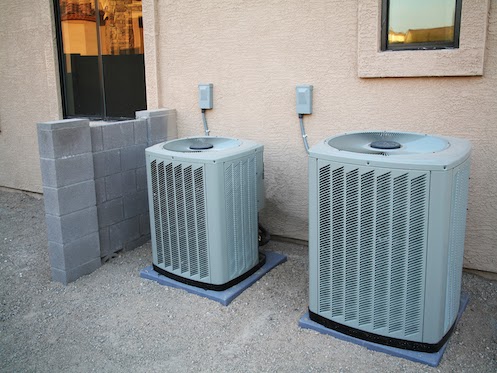Both heat pumps and central air conditioners have the ability to cool a house effectively. A heat pump, however, can also provide heating in mild climates. Each of these HVAC systems has its perks and drawbacks as well as some key distinctions. Here are four tips you can use to help choose between a heat pump and a central air conditioning system.
1. Choose the Type of System That You Want
The vast majority of Texas houses that have central air conditioning use a split AC system. If a house already has a furnace, these systems are the most cost-effective means of cooling the space. With this type of system, the evaporator coil is physically separated from the condenser coil as well as the compressor.
The evaporator coil in a split AC system is responsible for removing moisture and heat from the air while the condenser coil and compressor distribute the cooled air throughout the house. Most split air conditioners include an outside unit that houses the coils and compressors while the evaporator is usually found in a basement or crawl space.
Heat pump systems come in one of two types: air source or geothermal. With air-source systems, heat gets transferred from either the inside or outside of the house to provide the desired heating or cooling effect. If you opt for a geothermal heat pump, you’ll have a ground loop installed. This type of system consists of fluid-filled pipes that run under your yard and carry heat away from your house.
2. Perform a Thorough Feature Comparison
Assessing an AC system in San Antonio for its cooling features is essential to choosing one that can meet your needs. Contact Air Authority, A Riteway Service Company now to get the features of your current AC system assessed and for help deciding whether to install a heat pump. We provide a wide range of HVAC services, including heat pump installation and repair.
If you have central air conditioning, the system produces cool air and spreads it throughout the house using ductwork and air vents. A heat pump, on the other hand, doesn’t produce cold or warm air. Instead, it transports air inside a home to the outside to provide the desired cooling or heating effect.
The cooling-only capacity of central air conditioning is a distinguishing characteristic. This type of system can’t provide heating unless you install a separate furnace. With a heat pump system, however, you can heat and cool your home all year round. Heat pumps perform best when the exterior temperature is at least 40 degrees Fahrenheit, but they still offer both heating and cooling features, unlike central ACs.
The efficiency levels that heat pumps and central AC systems feature are an additional contrast between the two. Heat pumps and central air conditioners share the ability to function with little energy consumption. However, heat pumps use more energy to provide the same effect as central air conditioning when outside temperatures decrease. Still, in climates with mild winters, heat pumps can provide considerable savings on heating expenses.
You’ll also want to consider the maintenance features of a heat pump versus a central AC when choosing the best option for your home. The required maintenance schedules for a heat pump or central AC are fairly simple to follow. With central AC, you’ll need a tune-up once or twice a year in addition to monthly filter changes during the cooling seasons. A heat pump’s maintenance schedule is even less intrusive, requiring an inspection of parts only twice a year.
3. Consider the Pros and Cons of Each System
In addition to understanding the key features and distinctions between heat pumps and central AC systems, it’s helpful to understand their pros and cons. By comparing their advantages and drawbacks, you’ll have a better idea of which type will save you the most money on heating and cooling expenses while still meeting your comfort needs.
Heat Pump Pros
Heat pumps receive power via electricity, eliminating the need for either natural gas or a propane tank. Through a duct system, heat pumps evenly distribute the warmth they produce throughout your home, greatly reducing cold spots.
The efficiency of a heat pump, and especially a geothermal heat pump, is another major benefit. Heat pumps often provide a higher volume of warm and cold air than the energy they use. They also come with the advantage of being easier to maintain since the technician checks both sections of the system during their twice-yearly inspections.
Heat Pump Cons
Heat pumps are a great choice for homes in mild climates. For homes where the temperature often dips below freezing, though, having a heat pump is risky. In freezing temperatures, there is a greater risk of the electricity going out. And if the electricity goes out in a home with a heat pump, the heating system goes out too.
Another drawback of heat pumps is their up-front cost, which tends to be much higher than that of a furnace. Furthermore, there’s a downside with regard to a heat pump’s lifespan and durability. Central AC systems can last anywhere from 20 to 25 years as long as they are well-maintained. Heat pumps, on the other hand, usually last only 10 to 15 years. The reason for this is clear: Central AC systems run only during the cooling seasons. Heat pumps, however, run all year.
Central AC Pros
A central AC system specializes in cooling a home. This type of system provides the greatest cooling effect when compared with other options. If you have a large home that you want to keep cool in all parts, using a central AC is the best choice because it provides quiet and efficient cooling. You can even pair the system with an air purification system to further enhance the home’s overall comfort.
Central AC Cons
The biggest con of a central AC system, especially when compared to a heat pump, is its inability to generate heat. However, when you live in San Antonio, where the average temperature during the winter is 63 degrees, you don’t necessarily need a heater on a regular basis. Still, if you want your home to have heat, you’ll have to install a furnace if you opt for a central AC system.
4. Understand the Key Distinctions
Understanding the key distinctions between heat pumps and central AC systems will help you make the smartest investment for your home. The key differences are:
- Heat pumps pull in warm air from outside to heat the inside of a home.
- Central AC systems have lower up-front costs.
- Heat pumps provide greater levels of cooling efficiency.
- Heat pumps don’t perform well in regions that regularly experience freezing temperatures.
- Central AC systems have higher utility expenses.
- Heat pumps that get used all year don’t last as long as central AC systems.
Are You Ready for a Heat Pump?
If you’re considering replacing your AC with a heat pump, contact Air Authority, A Riteway Service Company today. One of our technicians can perform an assessment of your home to help you make the best choice possible. We specialize in a vast range of heating and cooling services, including AC repair, heater repair, air duct cleaning, indoor air quality, and ductless air conditioning. Contact us now to book an HVAC installation inspection.





